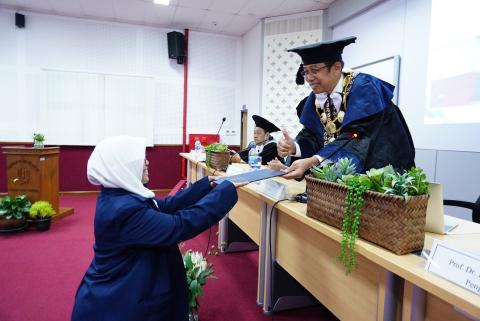You are here
DEVELOPMENT OF NITENI, NIROAKE, NAMBAHI (TRI-N) LEARNING MODELS TO DEVELOP EARLY CHILDHOOD CHARACTER

Early Childhood Education (PAUD) is a coaching effort for children from birth to six years through stimulation of Religious and Moral Values, Cognitive, Language, Motoric, Social Emotional and Art aspects. The Character Education Strengthening Program (PPK) listed in Presidential Decree No. 78 of 2017 needs to be developed for children from an early age because it is a stage of emotional, social, and spiritual growth and development. Strengthening character in early childhood can stimulate children's skills in managing their own emotions so that they are able to interact with others. "Character is closely related to aspects of behavior, attitudes, ways and qualities of a person that distinguish one person from another," explained Nur Hayati, M. Pd, an IP Doctoral Student in the Open Dissertation Examination which was held offline at the Graduate School of UNY.
One of the educational concepts developed by Ki Hajar Dewantara is Niteni, Niroake, Nambahi (Tri-N) concept where the implementation can be attractive to students, so that children can examine the material, then imitate what the teacher explains and encourage children to develop learning activities that have been child did. The niteni, niroake, add learning model to develop early childhood character which is supported by Bandura's social cognitive theory and Constructivistic theory. Character development in this study was stimulated through the Niteni, Niroake, Nambahi learning models which are in accordance with Bandura's social learning concepts and constructivist learning. This development research refers to the R&D model developed by Borg and Gall which consists of 10 steps.
In front of the Promoters and Co-Promoters as well as Examiners, Nur Hayati explained the results of the Tri N MP research which resulted in developing the character of honesty. affection, loyalty, trust. respect, and responsibility. Then the Learning Model includes syntax, social systems, reaction principles, support systems and learning impacts. This research resulted in the development of a niteni, niroake, nambahi (Tri-N) learning model to develop effective early childhood character
The results of the empirical test prove that the Tri N learning model developed meets the criteria of being feasible, effective, and practical. In addition, the MP Tri-N model is proven to be able to encourage children to remind each other of the good that children did not do before. "The Tri-N MP product in the form of a story book also has a uniqueness with a spiral A3 (bigbook) size which makes it easier for teachers to tell in class." Close Nur Hayati. (ants)

FAKULTAS DI UNY
- Fakultas Ilmu Pendidikan
- Fakultas Bahasa, Seni, dan Budaya
- Fakultas Matematika dan Ilmu Pengetahuan Alam
- Fakultas Ilmu Sosial dan Ilmu Politik
- Fakultas Teknik
- Fakultas Ilmu Keolahragaan dan Kesehatan
- Fakultas Ekonomi dan Bisnis
- Fakultas Vokasi
- Fakultas Psikologi
- Fakultas Hukum
- Fakultas Kedokteran
- Sekolah Pascasarjana
SEKOLAH PASCASARJANA UNY
Kampus Karangmalang, Yogyakarta 55281
Telp. +62274-550836 (front office)
Fax. +62274-520326 Email: pps@uny.ac.id, humas_pps@uny.ac.id
Website : http://sps.uny.ac.id
Copyright © 2026,


